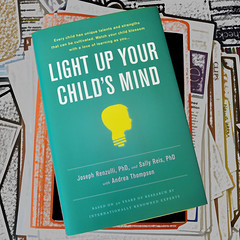 Light Up Your Child’s Mind, a new book written by Neag School of Education professors Sally Reis and Joe Renzulli, is aimed directly at parents, offering them practical advice on how to play a more meaningful role in a child’s education, both in and out of the classroom.
Light Up Your Child’s Mind, a new book written by Neag School of Education professors Sally Reis and Joe Renzulli, is aimed directly at parents, offering them practical advice on how to play a more meaningful role in a child’s education, both in and out of the classroom.The idea for the book first came about when they were contacted by an agent who had seen a story about their work in Psychology Today. That led to the search for a collaborator, someone who, Reis says, “could take the heart of our academic research and make it interesting and accessible for parents.” They found that person in Andrea Thompson, a New York-based freelance writer who has worked on several books dealing with parenting and psychology.
While the book includes research and interviews with parents and children, for Reis and Renzulli it is also a very personal story. They freely discuss the problems their own children faced as students; a son was, they say, “a classic underachiever,” while a daughter was found to be gifted but learning disabled, what Reis and Renzulli call “twice exceptional.” Now young adults, both have had very successful college and graduate school records and professional careers, and they had no objection to being part of their parents’ book.
Each child also illustrates the book’s different approaches to parental involvement. With their son, Reis and Renzulli say, there was little they could do to prod him through his adolescent school years.
“It was difficult personally, but we also felt that, professionally, this was something we should fix,” Reis says. “Ultimately, we realized that this was going to have to be his decision, not ours.”

With their daughter, Renzulli says, he and Reis were her “best advocates,” helping her teachers understand both her strengths and her weaknesses. “Teachers are receptive,” Reis says, “to parents who say, ‘I’m looking for a way to help my child be more engaged at school, and this is what I know about him or her that might be helpful to you.’”
Throughout the book, Reis and Renzulli reinforce the message to parents that can be found in its earliest pages: “We urge a different focus,” they write in the Introduction, “one having less to do with good grades and the ‘right’ colleges and more to do with early experiences in creative thinking and productivity.”
While not wanting to diminish the importance of grades and scores, Reis and Renzulli say they dislike seeing bookstore shelves crammed with standardized test preparation study guides that parents have been led to believe are the keys to success. Equally, if not more, important, they argue in Light Up Your Child’s Mind, is nurturing passions, interests and talents outside the classroom, not unlike the effort parents undertake when a child plays soccer or basketball.
“There’s as much to be gained,” Renzulli says, “from taking a child on a museum visit, or on a bird-watching hike, or on a local archaeological dig. All of it helps promote a love of learning.”
As for school itself, enjoyment and engagement go a long way toward stimulating academic achievement. But if it sounds as though Renzulli and Reis want to replace an “eat your vegetables” approach to education with one that favors “eat more ice cream,” nothing could be further from the truth.
“We’re advocating a buffet,” Reis says. “School should be a selection of introductions to big ideas, to names, events and people, coupled with choices made by the student in the areas he or she is interested in.”
For Renzulli, years of experience have taught him that engagement works. “I can get more out of anybody, diapers to doctorate, if I start with something in which they have an interest. We all do better and work more effectively at something that we’re turned on to and enjoy.”
Light Up Your Child’s Mind is published by Little, Brown and Company.
 Facebook
Facebook
 Twitter
Twitter
 LinkedIn
LinkedIn
